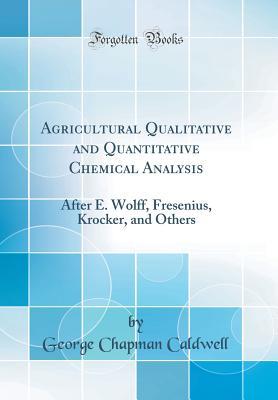Read online Agricultural Qualitative and Quantitative Chemical Analysis: After E. Wolff, Fresenius, Krocker, and Others (Classic Reprint) - George Chapman Caldwell | PDF
Related searches:
Qualitative and quantitative analysis of agricultural dust in working
Agricultural Qualitative and Quantitative Chemical Analysis: After E. Wolff, Fresenius, Krocker, and Others (Classic Reprint)
View of Agricultural Economics and Qualitative Research
(PDF) Qualitative and quantitative approaches to study adoption of
Comparison of qualitative and quantitative approaches to soil quality
Agricultural qualitative and quantitative chemical analysis
Quantitative Theoretical and Conceptual Framework Use in
QUALITATIVE AND QUANTITATIVE LAND EVALUATIONS
Large-scale plantation and contract farming effects: qualitative and
Qualitative research and analyses of the economic impacts of cash
Tintswalo M. - Research Technician-Qualitative and Quantitative
Qualitative and Quantitative Evaluation Expert, MCC Togo
QUALITATIVE AND QUANTITATIVE PHYSICAL - WUR E-depot
Agricultural qualitative and quantitative chemical analysis.
Agricultural Economics and Qualitative Research: Incompatible
Details - Agricultural qualitative and quantitative chemical
Qualitative - Gender, Agriculture, and Assets Project
Exploring agricultural production systems and their
Agricultural qualitative and quantitative chemical analysis item preview remove-circle share or embed this item.
The presented quantitative and qualitative analysis of dust in agricultural working environment is a continuation of the process of recognizing the exposure to dust among private farmers.
Qualitative and quantitative physical land evaluation: an operational approach.
Abstract the disciplinary paradigm of agricultural economics emphasizes rational behavior in a world constrained by scarce resources. The research practice focuses on the quantitative modeling of optimization behavior. These models, though, only offer limited support to practitioners in solving real-world problems.
4 mar 2021 monitoring and evaluation consultancy in togo about agriculture, requiring 5-9 years of experience, from si; closing on 31 may 2021.
Qualitative and quantitative approaches to study adoption of sustainable agricultural practices: a research-note on mixed method approach.
The agricultural industry is confronted with the need of increasing the production to feed a growing population, and contemporarily to manage the decreased.
Currently a research technician in the microbiology lab of the agricultural research council from september 2010 to date.
Agriculture, technological innovations, adoption, qualitative analysis, drivers. The agricultural industry is confronted with the need of increasing.
Burnod perrine, rakotomalala heriniaina, rasolofo patrick, brès aurélie. Large-scale plantation and contract farming effects: qualitative and quantitative.
The qualitative and quantitative outputs of both the cld and sf models are then used to evaluate sustainability based on indices of economy, environment, and social welfare. The framework for agricultural production systems modelling with system dynamics implemented in this study.
Agricultural qualitative and quantitative chemical analysis by caldwell, george chapman, 1834-1907. Publication date [1869] topics agricultural chemistry publisher.
The rise of mixed methods approaches to development-oriented research has brought new attention to qualitative research methods. This paper describes the use of qualitative approaches to illuminate gender relations in agricultural development research and project implementation. For gender research, qualitative methods can be particularly helpful in illuminating how men and women view their lives.
Qualitative research paper 45 have great discussions of quantitative research methods and useful checklists. Additionally, language from merriam’s, qualitative research, can be helpful. Definition of key terms keep this brief, if extensive a glossary is required, which would belong in the appendices.
4 feb 2017 since the last few decades, the efforts of explaining social aspects within agricultural research have gained importance, but in evaluating.
Nonetheless, qualitative data usually draws from a smaller sample of people and thus can be more subjective and difficult to draw out general patterns. The next paragraph highlights the benefits and challenges of this method. For more detailed information about qualitative methods see the methods section of the gender and assets toolkit.
Download citation qualitative research in agricultural economics: paradigms, purposes, and evaluation criteria the qualitative.
Qualitative research in agricultural economics in the united states and canada in comparison to rural sociology or communication and extension, the use of qualitative research strategies is less developed in agricultural economics. Ethnography and case studies are accepted research approaches in rural sociology.
Simulation modeling and qualitative land evaluation techniques, leading to the usda land capability system for on-farm planning function in the 1980s.
Climate services for agriculture: qualitative evaluation through a gender lens.
Qualitative research relies on data obtained by the researcher from first-hand observation, interviews, questionnaires, focus groups, participant-observation, recordings made in natural settings, documents, and artifacts.
Agricultural economics and qualitative research: incompatible paradigms? vera bitsch.
Food and agriculture organization of the united nations (fao). The project is carrying out a series of studies to understand the economic development impact.
With a heuristic research approach, this study used content analysis through a review of the agricultural education and qualitative research literature to build the conceptual framework. The analysis included the history of qualitative research, types, sampling, data.
Agricultural literacy of k-12 students is a national priority for both scientific and agricultural education professional organizations. Development of curricula to address this priority has not been informed by research on what k-12 students understand about the agri-food system.

Post Your Comments: